Matt Rees's Blog - Posts Tagged "israeli"
The Writing Life: Evan Fallenberg
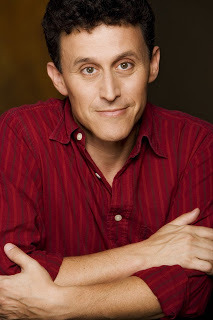
The most stirring, dramatic novel I’ve read in many years is Light Fell by Evan Fallenberg. It’s the story of Joseph Licht, an Israeli family man who falls in love with his rabbi. At first it looks like it might be the tale of their forbidden romance, but the book takes a startling turn and Licht is forced to face the religious beliefs, prejudices, and resentments of his sons. Light Fell has won or been shortlisted for: the Barbara Gittings Stonewall Award; a National Jewish Book Award; the Edmund White Award; and a Lambda Literary Award. Fallenberg's also one of the leading translators of Hebrew literature, including Batya Gur's Murder in Jerusalem, Alon Hilu's Death of a Monk, and Meir Shalev's A Pigeon and a Boy, winner of the 2007 National Jewish Book Award for fiction and a finalist for the PEN Translation Prize. A proud native of Cleveland, Ohio, Evan lives in a rural community near Netanya, Israel, where he runs a writing school in his back yard. I wish you could hear him read from his work, because he’s a compelling, engaging presence—go and hear him if you get a chance. Meanwhile, here are his fascinating thoughts on writing.
How long did it take you to get published?
That was a long, protracted process that would look like a mountain range if it were mapped out. Several years, really.
Would you recommend any books on writing?
For teaching I mostly rely on Writing Fiction by Janet Burroway; Creating Fiction, edited by Julie Checkoway; Pat Schneider's Writing Alone and with Others; and What If? by Pam Painter and Anne Bernays. As a writer I've been enriched by writing books penned by Jane Smiley, Francine Prose, and especially Ben Yagoda (The Sound on the Page) and, the best of them all, EM Forster's Aspects of a Novel.
What’s a typical writing day?
I only learned what my typical writing day was a few years ago, when I was a guest artist at the MacDowell Colony and my days were entirely my own. Until then it had simply been a matter of finding an hour when no spouse, boss, child or chore needed me. But when able to choose, I like to rise early, write a scene or two, eat a hearty breakfast, take a mid-morning nap, and settle down to work again for a long stretch from noon until dinner.
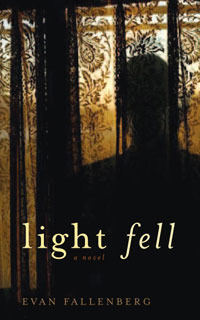
Plug your latest book. What’s it about? Why’s it so great?
Light Fell is the story of Joseph Licht, an Israeli who in 1976 leaves a life of certainties (wife, children, religion, a position in society and academia) for a great and forbidden love with a dynamic young Orthodox rabbi. Since it's impossible to offer credible, objective (!) feedback on one's own book, I'll quote the judges of the American Library Association's Barbara Giddings Stonewall Award, who awarded their fiction prize to Light Fell this year: "With rich characterization and eloquent writing Fallenberg explores the inner lives of a family and the universal applicability of the social and religious issues they face." For me as a reader, books need to have engaging characters of depth taking part in a gripping story that I can relate to no matter how different my life is to theirs, and written in language that is at the same time rich, precise and unselfconscious. The judges' comment makes me feel as though I have succeeded in writing book that even I would like to read!
How much of what you do is dictated by a genre?
I certainly don't fit into any genre that I know of. Writing, for me, feels like reinventing the wheel every time. But I wouldn't want it any other way. After all, if you are just writing an altered version of what someone else has already done, why bother?
What’s your favorite sentence in all literature, and why?
The closing lines of a poem by the Mexican poet Amado Nervo:
Amé, fuí amado, el sol acarició mi faz.
¡Vida, nada me debes! ¡Vida, estamos en paz!
(I loved, I was loved, the sun stroked my face.
Life, you owe me nothing! Life, we are at peace!)
I learned this poem by heart when I was twelve or so. Back then it was just a jumble of pretty words in Spanish. But it has come to feel like a motto for life, one I believe in every day and hope to do so to my very last.
What’s the best descriptive image in all literature?
There is certainly no one best descriptive image, but the one that jumps to mind (and does so quite often) is from Carson McCullers' short story The Sojourner, which made a huge impression on me many many years ago: "Fair Elizabeth, rosy and naked before her bath. Half-dressed before the mirror of her dressing table, brushing her fine, chestnut hair. Sweet, casual intimacy, the soft-fleshed loveliness indisputably possessed." It's that 'soft-fleshed loveliness indisputably possessed' that gets me every time.
Who’s the greatest plotter currently writing?
Probably Lionel Shriver, an American-born writer living for many years in London. Her book The Post-Birthday World is a masterpiece. Every time she took me to a new plateau I thought I'd reached the summit, but there was always more.
Who’s the greatest stylist currently writing?
I'll go with British writer Michael Frayn, since he is capable of brilliance in every genre he tries: theater, nonfiction, novels.
How much research is involved in each of your books?
The research is great fun, and I could get carried away with it. The book I'm working on now 'required' me to travel to Warsaw, Copenhagen and Berlin AND take ballet lessons. Maybe my next book should involve a Tahitian beach, somehow.
What’s your experience with being translated?
In my case, the question should read "What's your experience with translating?" since that is my vocation. I've had the privilege and pleasure of translating some very fine Israeli writers, including Meir Shalev, Ron Leshem, Batya Gur, Alon Hilu… Every book is an act of ventriloquism, trying to find a voice that isn't your own but isn't exactly the writer's either, since you're rendering this voice in a new language (and culture). My goal is to provoke the same reactions in the English reader that the Hebrew reader would have experienced when reading the original. But the art of translation is imperfect from the outset. The biggest compliment for me came from a reader of my translation of Meir Shalev's A Pigeon and a Boy, who told me she felt as though Meir Shalev had actually written this book in English.
Do you live entirely off your writing? How many books did you write before could make a living at it?
At this point I could only live off my writing by building a tent out of book covers and eating all the pages. But I do actually make my living from a mix of writing, translating and teaching creative writing. So I live off words, that's for sure.
How many books did you write before you were published?
I'm one for one. Nothing in my drawers!
What’s the strangest thing that happened to you on a book tour?
Between two speaking engagements in my native Ohio I was to be interviewed by the local affiliate of National Public Radio. They needed me to be on a landline just when I had planned to visit my sister at the restaurant she owns, but the only quiet place was her office, which doubles as a storeroom. I stood there among huge cans of tomato sauce trying to sound cool and intelligent while the fax machine kept ringing and employees banged at the door looking for waffle batter.
What’s your weirdest idea for a book you’ll never get to publish?
I have a dream of collaborating with a composer-friend on a novella set to music, a sort of mini-opera in four voices. I'm hoping it's just crazy enough to happen.
Coffee cultures of Israelis, Palestinians...and Hawaiians
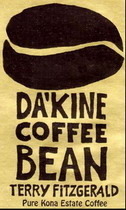 I have a lot of good reasons for staying in the Middle East as long as I have. I admit the main thing keeping me here 14 years and counting may really be inertia, but I also relish being an outsider, researching my Palestinian crime novels on site, visiting the Palestinian towns whose atmosphere of violence, decay and liveliness makes me feel so creative.
I have a lot of good reasons for staying in the Middle East as long as I have. I admit the main thing keeping me here 14 years and counting may really be inertia, but I also relish being an outsider, researching my Palestinian crime novels on site, visiting the Palestinian towns whose atmosphere of violence, decay and liveliness makes me feel so creative.Still, let’s get real: I’m here for the coffee.
There’s no place outside Italy where there’s a more sophisticated coffee culture than Israel, and nowhere on earth do you find yourself cajoled into drinking as much coffee as Palestine.
When I first arrived here, Israelis were drinking one of two kinds of execrable coffees. Middle-aged ladies seemed to go for “Nes,” which despite being the Hebrew word for “miracle” signified only that it was Nescafe instant, served with water so hot that it’d be a miracle if you could taste anything and with enough milk to make it look about the same shade as the skin of the sun-loving ladies who drank it. The alternative was “botz,” which is the Hebrew word for mud. To sum that up: why drink the liquid when you can also have the grounds stuck between your teeth for an hour or two?
In the last decade, however, the number of cafes – hip and less so – in Israel has risen sharply. Everywhere you go, even in Jerusalem and let alone in trendy Tel Aviv, there are bars offering top international brands from the ubiquitous Lavazza to Caffe Mauro and Bristot. It’s an Italian-style espresso-drinking culture and in some of the cafes they even understand how to maintain their espresso machines, thus guaranteeing a good cup.
See, at least there’s one thing about Israel which hasn’t gone to hell in a handbasket over the last decade. Don’t let anyone say I don’t look on the bright side.
Palestinians haven’t changed their style, however. (Which now that I think of it is also a good reflection of their role in the so-called peace negotiations over the past decade.) The way most of them like their coffee is cooked in a narrow-topped tin pan, boiling it over a gas flame with some sugar. “Masbuta,” or “just right,” for coffee with some sugar. “Sada,” or “bitter,” for funerals – and of course for Omar Yussef, the hero of my crime novels.
When in Palestinian towns, you’re greeted at every meeting by a small cup of thick coffee. You have to wait for the grounds to settle and then drink it before you can move beyond the small talk and get down to business. Every meeting, all day. Until you’re buzzing and wondering why all the colors are so bright, even though you’re inside and the shades are drawn. You’re also curious about the stabbing pains in your urethra….
Not that I only have coffee when I go out. Four years ago I quit journalism to work from home on my fiction. I get a monthly delivery of Lavazza for my home machine. It comes straight from the importer. Perhaps it’s the quantity I consume, but they seem to believe they’re delivering to a business address. Naturally I tell them I have an extensive staff, each of whom needs a lot of coffee, and that’s why they need to make an extra delivery again this month…
So with coffee being that central to my existence here, I was particularly intrigued to hear from a reader of my novels – and of this blog – named Terry Fitzgerald. TF informed me that my fellow blogger and terrific author of Bangkok crime novels Christopher G. Moore had signaled his approval of Terry’s Da’kine Coffee Bean, which he produces in Honaunau, Hawaii. He kindly offered to send me along a batch.
Now I used to be a journalist – when someone offers me something free, I’ll go to extraordinary lengths to secure it. In this case, I made several visits to my local branch of the Israeli Postal Service whence I eventually was able to wrest a bag of Terry’s prize-winning bean. (Check him out).
I’ve offered Da’kine to some Israeli friends, who commented with pleasure on its redolence of the most deliciously bitter of dark chocolate. I took it into Bethlehem for a rendez-vous with the real Omar Yussef. He drank it without sugar and with approval. As is traditional for a Palestinian when accepting a coffee, he said: “May Allah bless your hands. May there always be coffee in your home.”
This brand, too, I hope.
(I posted this on International Crime Authors Reality Check, a joint blog for me and three other authors of -- obviously -- international crime novels. Take a look.)
Published on March 03, 2010 23:03
•
Tags:
arab-coffee, blogs, botz, bristot, caffe-mauro, christopher-g-moore, coffee, da-kine-coffee-bean, espresso, hawaii, hawaiian, honaunau, israel, israeli, jerusalem, lavazza, masbuta, middle-east, nescafe, omar-yussef, palestine, palestinian, sada, tel-aviv, terry-fitzgerald
Hamas rebuilds in West Bank
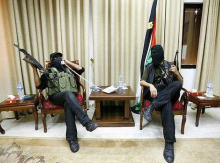 Hamas is steadily rebuilding its power in the West Bank, stockpiling weapons and material underground, biding its time for a renewal of the conflict with its Fatah rivals.
Hamas is steadily rebuilding its power in the West Bank, stockpiling weapons and material underground, biding its time for a renewal of the conflict with its Fatah rivals.Palestinian security officials have been telling me this for some time, and they are frankly filled with fear and foreboding. Palestinian President Mahmoud Abbas mentioned it again in an interview with the Arabic newspaper al-Sharq al-Awsat during the week, accusing Hamas of smuggling weapons to the West Bank.
The Hamas buildup is one of the reasons Abbas has allowed his independent prime minister, Salaam Fayyad, to stay in his job so long, despite the popularity Fayyad is accruing at the expense of Abbas’s Fatah. Fayyad has managed to reform the Palestinian security forces, persuading the U.S. to give tens of millions of dollars in security aid.
Without those reforms, the Palestinian security forces would either fold in minutes if faced with a Hamas uprising in the West Bank, or would even join Hamas to save themselves.
So it’s significant that after 10 days in which Abbas repeatedly berated Fayyad’s plan to declare a Palestinian state in 2011 — which would convince the world that if Fayyad could create a state, Fatah might’ve become irrelevant and therefore not worth the cash it siphons away — the president also highlighted the urgency of Fayyad’s most important achievement. (He first talked about it in an interview with a Kuwaiti newspaper in January, when he said he had “verified information” that Hamas planned to take over the West Bank by force.)
Of course, U.S. and European security advisers to the Palestinian security forces don’t claim to have made much of their new charges. If Hamas is able to recreate its West Bank network, the Palestinian security forces will hold up their advance for only about a week, they estimate.
That’s not bad, given that two years ago the Palestinian security forces were good for nothing much at all. A week might also buy time for a cease-fire, which might in turn preclude an Israeli invasion of the West Bank — it’s unimaginable that the Israelis would allow the West Bank to come under Hamas control.
Part of Abbas’ accusation against Hamas is that its leadership is allowing radical young military leaders to blow off steam by plotting a West Bank armed takeover. In return, those military leaders aren’t pushing as hard for rocket attacks against Israel from Gaza.
The Hamas leaders in Gaza are keen to avoid such attacks, because they’re barely recovering from the hammering they received a year and a half ago at the hands of the Israeli army. The cause of that war, remember, was rocket attacks from Gaza into Israel.
Hamas kicked Fatah out of the Gaza Strip in 2007. Fatah people were shot and tortured, and a few were tossed from tall buildings. Since then, both sides have engaged in a low-flame civil war which involves lengthy detentions without trial, torture and kneecappings.
The West Bank looks like an attractive playground into which Hamas can shove its angrier military types. After all, if the Fatah cops fail to intercept a Hamas attack against Israelis in or from the West Bank, Israel usually blames Fatah rather than Hamas.
Within the Izzedine al-Qassam Brigades, the Hamas military wing, support has been increasing for more militant action — yes, more militant than the leadership which ultimately wants to eradicate Israel but is prepared to wait a long time to do so. (In Gaza, that counts as dovishness...)
Those military leaders have turned, according to international analysts, to a brand of Islam more commonly called “Salafi.” In short, it’s the extreme Islam favored by many in the Gulf States. It’s quite alien to most Palestinians, who are conservative but not particularly fundamentalist in their religion. Still, once a military type gets stirred up, the hard line often looks appealing.
Abbas better hope he hasn’t leaned too hard on Fayyad. The week of grace his prime minister’s reforms will have bought him in the event of an attempted coup by Hamas might prove to be the difference between a nice retirement at his house in Dubai and the kind of kangaroo justice meted out by the Islamist in Gaza three years ago.
(I posted this on Global Post.)
Published on May 09, 2010 23:09
•
Tags:
abu-mazen, crime-fiction, dubai, fatah, gaza, global-post, hamas, intifada, israel, israeli, izzedine-al-qassam-brigades, mahmoud-abbas, middle-east, palestine, palestinians, plo, salaam-fayyad, salafi, sharq-al-awsat, west-bank
How to create empathy as a writer
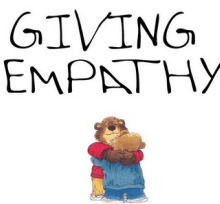 Malcolm Muggeridge (an old English literateur) once said that George Orwell “was no good as a novelist, because he didn’t have the interest in character.” Well, I didn’t need to tell you who George Orwell was, so you may doubt the judgment of the largely forgotten Muggeridge. But I think he was very close to an important factor for the novelist.
Malcolm Muggeridge (an old English literateur) once said that George Orwell “was no good as a novelist, because he didn’t have the interest in character.” Well, I didn’t need to tell you who George Orwell was, so you may doubt the judgment of the largely forgotten Muggeridge. But I think he was very close to an important factor for the novelist.Here’s why: Character creates empathy in a novel. It puts the reader in a relationship with the work. Muggeridge’s point was that politics were more interesting to Orwell than the people on whom he hung them. In “1984” we feel for Winston Smith because we imagine what it’d be like to be him – but we don’t really care that much for him as a character. In other words, if Orwell hadn’t had such a fabulous idea behind that novel, it would’ve failed because Winston was too much of an everyman.
Nonetheless, so much contemporary fiction fails the character test. Read the short stories in The New Yorker – which are fairly representative of today’s “literary” fiction – and you’ll generally see an authorial voice greatly distanced from the emotions of the characters. You’re not in a relationship with the characters, and you wouldn’t want to be in a relationship with the smart-ass authorial voice. Read the rest of this post on Matt Beynon Rees's blog The Man of Twists and Turns.
Published on May 27, 2010 05:40
•
Tags:
1984, crime-fiction, exotic-crime, exotic-fiction, fiction, george-orwell, ian-mcewan, israeli, jerusalem, malcolm-muggeridge, palestinian, the-new-yorker, wales, winston-smith
How to avoid writer's block
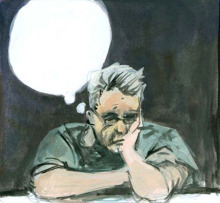 Writer’s block has nothing to do with writing.
Writer’s block has nothing to do with writing.That might seem obvious. When a writer wants to write, but can’t get anything out, he’s blocked. Not writing. Blocked.
But it isn’t the writing that causes the block. Neither is it some psychological problem or an inability to conjure up the Muse of inspiration.
It’s because the writer didn’t put everything on little index cards first.
Read the rest of this post on my blog The Man of Twists and Turns,a/>.
Published on June 06, 2010 06:10
•
Tags:
arabs, crime-fiction, fatah, gaza, hamas, israeli, jews, matt-beynon-rees, middle-east, palestinian, writer-s-block, writers, writing
Israeli settlements: frozen, still cooking
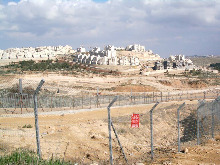 JERUSALEM — Palestinian negotiators said again this week they’d refuse to re-enter direct peace talks with Israel unless the current partial freeze on construction in Israeli settlements is extended when its term runs out in September.
JERUSALEM — Palestinian negotiators said again this week they’d refuse to re-enter direct peace talks with Israel unless the current partial freeze on construction in Israeli settlements is extended when its term runs out in September.But as a report released this week by the Israeli human-rights organization B’Tselem reveals, a real settlement freeze would have to be a very, very big chill.
B’Tselem’s report, called “By Hook or By Crook: Israeli Settlement Policy in the West Bank,” documents the massive scope of Israel’s settlement operation. It says that hundreds of millions of dollars are being paid to settlers, real estate developers and settlement municipalities as incentives to expand the settlements. It also highlights the manner in which every layer of Israeli bureaucracy continues to be involved in an expansion project that successive Israeli governments have pledged in international forums to halt.
For the human rights group, the issue is not political. Jessica Montell, B’Tselem’s executive director, said that the inequality of life in the West Bank — rather good if you’re an Israeli and pretty bad if you’re Palestinian — is the most objectionable upshot of the settlements, which she adds are illegal under international law.
“In the West Bank, your rights are based on your nationality,” she said.
Read the rest of this post on my blog The Man of Twists and Turns.
Published on July 23, 2010 22:03
•
Tags:
b-tselem, benjamin-netanyahu, east-jerusalem, george-w-bush, human-rights, israel, israeli, jessica-montell, middle-east, palestine, palestinian, road-map, settlement-freeze, settlements, tel-aviv, west-bank
Taking Refuge
 Some people are always expecting or hoping for a war. They’re even working towards that end. When you live in the Middle East, you come to such a realization eventually.
Some people are always expecting or hoping for a war. They’re even working towards that end. When you live in the Middle East, you come to such a realization eventually.Most people are like me, however. The wars sneak up on them. They notice the signs, then they bury them because they think they’re being unduly negative. Or they’re simply afraid to see what’s in front of them.
There might even be a war going on a short drive from where you live and it can more or less escape your attention. For example, over the weekend there were 120 rockets fired into Israel from the Gaza Strip. The Israeli army killed 19 Palestinians. I could’ve been down there in 45 minutes drive. But I was eating chocolate muffins with my son.
I can feel the war coming, just as you might sense someone creeping up behind you. Without hearing or seeing anything. Like an icy hand touching your back.
When a bomb went off in Jerusalem a couple of weeks ago, killing a British tourist, the icy hand had a grip on my guts. This was different to the intifada of the first half of the last decade. Then I was a journalist; I had to be here and I buried whatever trauma I felt under a thick layer of professionalism or duty. Now I’m a writer and a father, and I could be anywhere I want.
I’m still here in Jerusalem. It’ll be 15 years in six weeks. I keep trying to think of somewhere else to go. Somewhere less hostile and aggressive. I haven’t figured it out yet.
For a while, I’ve thought it might end the way it started—with someone else more or less deciding for me. In 1996, I came here because I met a woman who had taken a job here. That got me out of a job in New York I hated but was unable to bring myself to leave.
Read the rest of this post on my blog The Man of Twists and Turns.
Published on April 15, 2011 22:43
•
Tags:
exile, frankfurt, gaza, israeli, jerusalem, middle-east, palestinian, terrorism



